- Home
- Duncan James
Spy People Page 3
Spy People Read online
Page 3
There was one thing they all agreed about. The Cabinet office ‘mole’ had to be silenced and in double quick time. Never mind collecting enough evidence to sack the man. By then it would be too late. He must be moved before he could be of any further use to the Russians; before he learned about Professor Barclay’s new identity as Dr. Lloyd; before he knew that Lloyd was going to Switzerland; before he could learn anything new or potentially damaging to the operation to save Barclay’s life.
As luck would have it, the poor fellow was involved in a nasty road accident on his way home from work, seemingly run down by an old Morris Minor, which didn’t stop, and made off at surprisingly high speed for such an old car. Nobody got the car’s number, and the Cabinet Office clerk died in Hospital later that night.
Miller was waiting for breakfast the next day at the Holiday Inn where he was staying, near the Swiss village of Meyrin where the CERN facility was based, when his mobile phone rang.
Maybe he was going to be with Lloyd longer than he had hoped after all. Makienko had disappeared from the Trade Mission, and hadn’t been seen since yesterday morning. Although he had been told to leave the country, somehow the MI5 blokes had lost touch with him, and were desperately trying to find out what had happened to him and where he had gone. The only thing they were sure of was that he hadn’t been on any of the recent flights to Moscow, or to anywhere else in Russia for that matter.
“We have no idea whether he’s heading your way or not, so relax,” said Clayton. “He’s probably going to Russia the long way round. Frankly, we thought MI5 was keeping tracks on him but they seem to have lost him for the time being.”
“It’s OK for them. They’re in London in the warm, and I’m out here freezing to death on my own. But until we’re sure where he is, a bit of support would be useful out here, even just to give me a meal break.”
“We’ll do what we can,” said Clayton. “But you’re well-armed, if you need to be,”
Having checked all the snow reports and weather forecasts, Dusty Miller and Roger Lloyd decided to head for Rochers-de-Naye that weekend, where, at 2,045 metres, there was already enough snow for some decent skiing, and more was forecast during the next few days. They booked overnight bed and breakfast in Montreux, near the station, and caught the first train in the morning up to the summit. After that, they planned to spend a couple of nights at the tiny resort of Paccots, which boasted a station on the same rack-and-pinion rail line, but not much else.
***
It was about that time too that the people in Clerkenwell heard that Makienko had booked a flight to Zurich.
It was the duty officer who had taken the call from the Head of Section 11. There were a couple of other men in the Ops. Room at the time, busy running or monitoring their own operations, but the Duty Officer was the one who had to react to emergencies.
This was an emergency. No doubt about it.
Two o’clock on a Saturday afternoon was not the best of times to start some sort of rescue operation, especially abroad, but that’s what this was. Albert Piper, known by colleagues as ‘Whistler’ Piper, knew exactly what to do, so got on and did it without a moment’s thought. He knew all about the ‘Barclay’ case. It had been part of his briefing. He knew that Dr. Roger Lloyd had gone to Switzerland only yesterday, escorted by Dusty Miller ‘just in case’. He knew about the Russian agent Makienko, too, and that he had returned to Moscow earlier.
What he didn’t know, and hadn’t expected, was that MI5 had lost track of Makienko at Heathrow, and that he hadn’t gone to Moscow after all. Apparently, he was on his way to Switzerland even now. That’s what ‘S’ had said. Having made a right mess of things, MI5 now passed the buck to Section 11 to sort out. Thanks very much!
They immediately told Miller, who swore.
“That’s a long way from where we are,” Miller said, “but I don’t like the smell of this.”
“Neither do I, to be honest,” admitted Clayton. “And,” he continued, “I’m sorry to say that Zurich is not really all that far from where you are. If he changes trains at Lausanne, he can be in Montreux in just over three hours. And he bought a Swiss Railways travel card before he left, when he got his airline ticket.”
Miller swore again.
“Is he looking for us, do you think?”
“Who knows? He was at the funeral, but if he wasn’t convinced, he might just be taking an interest in Lloyd, to be doubly sure.”
“He might just be even better than we thought, too.”
“Give me co-ordinates of where you are,” commanded Clayton. “Make sure you keep in touch, and tell us your every move. Keep your ‘Delta 7’ tracking device activated and with you at all times, and I’ll do my best to get some back-up to you as soon as I can.”
Miller had enough problems already, without HQ adding to them, but the S.11 organisation went into overdrive to get immediate support out to him.
Even the standby RAF Hercules crew thought a weekend in Switzerland might be a better idea than some sort of emergency relief flight to Afghanistan. The weather didn’t look too brilliant, though, especially not for a low-level drop of Special Forces Paratroops in those mountains. Snow was forecast, and there was nearly always mist or fog at about 2000 metres at this time of the year. Could be a bit dodgy.
“Channel 19 on your radio,” Clayton told Miller, “for direct contact with your support. The Swiss Army will be listening out, so don’t hesitate to use it as an emergency frequency. They’re used to working in that terrain.”
“So I should hope,” said Miller. “They bloody well live here.”
***
Everything moved very fast, but very efficiently. It had all been well rehearsed before, in training exercises, but this time it was for real.
Clayton rang his Deputy, Nick Marsden.
“Makienko is on his way to Switzerland. Miller is on his own with Lloyd, skiing above Montreux, and totally isolated. Can you get your Arctic team together?”
“Consider it done,” replied the Special Boat Service Commander.
“We’ve already alerted the standby RAF Hercules, and the duty pilot is doing a flight plan. The Military will do all the overflying clearances.”
“Good. We keep all our kit at Brize Norton, ready to move. With any luck, we can be airborne in about four hours or so.”
“I’ll get my chums at the Ministry of Defence to sort out the Swiss military to give you support once you get there, and get the Foreign Office to organise the diplomatic side of things. Keep in touch. Full briefing when you’re airborne.”
Clayton rang the Cabinet Secretary, chairman of the JIC, and quickly briefed him.
Sir Robin Algar shared Clayton’s concern. “Diplomatically, this is very tricky,” he announced. “Sending armed troops into a foreign country is never the easiest thing to arrange, especially at short notice, and this is even more complicated because of Switzerland’s cherished ‘neutrality’.”
He thought for a minute. “I’ll get the Foreign Secretary to have a word with his opposite number in Bern, and I’ll have a word with the Ambassador, who I know quite well, fortunately.”
“Don’t forget that Lloyd has taken Swiss nationality. At least we shall be protecting one of their own citizens, as it happens.”
“Good point. Let’s just hope they don’t decide they would rather protect him themselves.”
“I’m organising military back-up for our team when they arrive,” said Clayton, “and the RAF is doing all the flight planning, sorting out overflying rights, and whatever else they need in order to get there.”
“When will they get there, as a matter of interest?”
“With any luck, in about six hours or so.”
“They don’t hang about, do they! I must get a move on. Diplomatic channels are not known for moving that fast. Six days would be more like it!!”
***
For Lloyd, it had been a hectic few days, and not a little stressful as well at the end of a
horrendous few weeks. He had not enjoyed the quiet ceremony at the crematorium. It was odd, and distressing, to see so many of his old colleagues in the congregation, paying him a respectful farewell.
At least none of them had recognised him in his new guise. He did his best to ignore them, and to concentrate on his own need to say farewell to his estranged brother. It was too late to wish that they had been closer in life. That was all in the past now. It was embarrassing listening to his own eulogy. He wondered who had written it.
But he had no time to dwell on it. Within hours, he was off to Heathrow, to start a new life under a new name. He had so much to remember. At least his new friend Dusty Miller would be with him for a few days. That was a comfort. But after that he would be on his own, in a new country, a new research post to tackle and few friends around him for support. He knew he could always contact the good people in Clerkenwell who had looked after him so well, or even one or two people at Culham, but he would need to be exceptionally careful; if the Russians had the slightest suspicion that he was still alive and that it was his brother who had been shot, he could still be in mortal danger.
Nobody had told Lloyd that his would-be Russian assassin had been at the crematorium.
Now a Swiss citizen, Lloyd had to settle to his new life in Switzerland. No time for a holiday, to catch his breath after the events of the past twelve months: the highs and lows of his nuclear fusion research project, the seemingly endless travel, the papers and lectures he had been required to prepare and deliver. It was as well that he had no idea then that his life was under threat at the end of it all, and that dedicated men and women were facing danger night and day to protect him. How could he ever thank them?
One of them was with him still, for a few days, as a precaution. To be honest, they were both in need of a break, so they had decided to spend at least a couple of days on the slopes skiing. Delightful scenery, good snow, excellent food and the odd drop of Jägermeister schnapps, in good company. He was beginning to relax for the first time in months. At Miller’s suggestion, they decided, after lunch at the Restaurant Alpin on the summit, to get away from the regular slopes and ski cross country. Lloyd had no idea, of course, that Miller was worried that Makienko might find them, and could not make up his mind whether they were safer among the crowds on the piste, or whether heading off on their own might be a better bet. Miller certainly stood a better chance of spotting Makienko out in the country, but on the other hand, the Russian would have a clearer shot out in the open - if he was there.
There was a well laid out cross-country trail starting from near the restaurant. By now, it was snowing hard, but they had nevertheless decided to turn off the loipe for some real cross-country on virgin snow. They planned to make their way along the top of a ledge once they had crossed the ridge, to a narrow valley which would lead them through the woods to more open snow, and a clear run back to Paccots.
Makienko saw them from across the valley, and noticed that Lloyd had no stick, no limp, and no spectacles, either, all of which were supposed to be part of his new identity. He lowered his binoculars, fastened his skis, and took the Kalashnikov from his back-pack.
Miller had been keeping a good look out for other skiers, so was taken quite by surprise when a single shot rang out.
Lloyd fell with a shout of pain, and clasped his left shoulder. Miller threw himself on top of the sprawling figure, turning his head in time to see the gunman fire another round, before setting off at speed along the ridge. The bullet grazed Miller’s leg, before splintering bark from the pine tree behind him.
There was blood oozing through Lloyd’s fingers. Miller tore off his scarf, stuffed it with snow, and clamped it to Lloyd’s shoulder.
“Hold that there, and don’t move, whatever you do,” commanded his friend. “I’ll be back.”
For the first time, he noticed that Miller was armed – some sort of machine gun that he had pulled from his back-pack.
Miller sped off into the snow, gun at the ready. Lloyd was in pain, and losing blood. He could see it staining the snow. He felt dizzy and faint, and wondered how long he would be left there. After a short time, he heard shots ring out from further down the valley, and then silence. He had no idea how long he had laid there on his own, as he kept losing consciousness, probably because of the shock and the cold, but eventually he was aware of a flurry of activity around him, as strange figures in white bent over him.
“Dr. Lloyd?” asked one.
“Yes”.
“Good. Let’s have a look at that shoulder.”
Two of them were quick and professional at tending his wound, while others looked on. Roger Lloyd noticed that there were two ski-scooter things that they had arrived on, and that one of the others was talking on a hand-held radio. They were all in white uniforms, with crash helmets on.
Lloyd had no idea what was happening or who they were. This was yet another experience to add to all those others which had thrown him into such confusion in recent weeks, and made life such a living nightmare.
“Who are you?” he asked the female who had dressed his wound. He tried to sit up.
“Don’t move! You’re going to be OK. We’re a unit of the British Special Forces. We heard you were in trouble so came to help.”
“How did you get here?”
“By parachute. We’ll tell you later. But where’s the man you were with? We’re looking for a colleague, Staff Sergeant Dusty Miller.”
“He went after the gunman, I think.” Lloyd pointed. “That way.”
The man on the radio shouted.
“The boss has found Miller. He’s in a bad way. We’re to get there ASAP.”
“We’re on the move then,” the girl with the Red Cross on her arm told Lloyd. “We’ll take you with us.”
She shouted across to her colleagues. “Give me a hand will you. Lift this man carefully onto a snowmobile and strap him in. He’s coming with us.”
They were soon speeding through the snow, which Lloyd noticed was now falling fast. In no time, it seemed, they found the rest of the party, and the medical orderly dashed over to a prone figure lying in the blood-stained snow. The centre of such a great deal of frenzied activity must be Dusty, thought Lloyd. Eventually, one of the others came over to Lloyd.
“Hello, Dr. Lloyd. How are you feeling?”
Lloyd thought he recognised the man, but couldn’t believe this was really happening.
“Commander Marsden! What on earth are you doing here?”
“We heard you and Dusty might be needing a hand, so dropped in to help. I’m told by my Petty Officer medical lady that you’ve nothing to worry about. Your wound will soon heal.”
“I’m feeling much better now, thanks to her. But what about Dusty?”
“Not looking good, I’m afraid. We’ll get him home to UK as soon as we can, and make sure the Swiss military look after you until you’re fit enough to get to your new flat. It looks as if Dusty is going to need a lot of specialist treatment.”
“My poor friend Dusty; it’s all my fault. I can’t believe all this. It’s like a dream, or perhaps a nightmare.”
“I’d better get back to him. I’ll fill you in on all the details later,” promised Marsden. “By the way, you won’t be having any more trouble from your Russian friend. He’s over there. Quite dead.”
“Did Dusty kill him?”
“No. I did.”
***
It was obvious from the way they were handling poor old Dusty that he really was seriously hurt. Marsden was very much in charge of things, and appeared to be in almost constant communication with people on his radio. Others in the small team, all of them armed, gave support where they could or when they were told, but not everyone could tend to Miller’s needs. Lloyd slowly managed to piece together what had happened, and how these brave men had got to him. This was the stuff of spy thrillers on television, and yet here he was, in the middle of it all, happening for real. He was way out of his depth, as he
had been for some weeks now since he had been whisked away from his laboratory and out of his comfort zone, into this other world of dreams and nightmares.
All this was because of him. Because somebody, somewhere, thought he was of such value to the country that he had to be protected, almost, it seemed, at any cost. Through the pain of his shattered shoulder, he felt quite guilty. Perhaps it would have been better if his brother had lived and he had fallen instead to that fatal bullet in his Battersea flat. At least then, they would all have been spared the tremendous effort that had gone in to transforming his personality and transporting him to Switzerland. Even here, they had come to protect him. And his poor friend Dusty would not now be lying, close to death, in the snow halfway up an unheard-of mountain in a foreign land.
They had said that they would be taking Dusty back to England, while he would be left here, to be looked after by the Swiss military. He could understand why he had to stay behind, but wished it was not so. Here, he knew nobody, but, by the same token, in England nobody knew Dr. Roger Lloyd. He had only recently been created. And to go home would probably be dangerous, and cause the authorities even more problems. He had caused them enough already. He was now a Swiss citizen, so he supposed it was right for him to be left behind, but it would not be easy. How would he keep in touch with Dusty? Who would be able to tell him how Dusty was getting on?
It looked as if the party was getting ready to leave. A man called Armstrong, who was second in command, came across to him.
“I shall be leaving soon with my section of the team, to lead the way back to civilisation,” he announced. “The Commander will follow with you and Mr Miller and the rest of the team. We shall do our best not to split up, but Miller is in poor shape and must be treated with great care. It’s snowing hard and will soon get dark, so if Miller finds the going too much, your party will hole up for night while we press on to our rendezvous with the Swiss Army recovery team. They have helicopters to take us to their Air Force base at Payerne. When we all get there, we shall transfer to our waiting RAF Hercules, and you will be transferred to the base sick quarters for proper medical attention. You can stay there until you are completely fit. Any questions?”

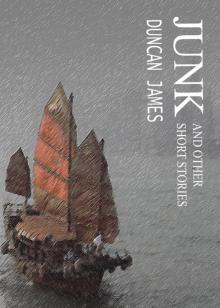 JUNK and other short stories
JUNK and other short stories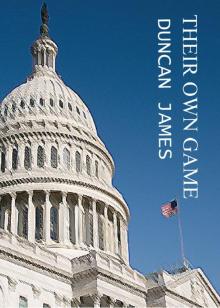 Their Own Game
Their Own Game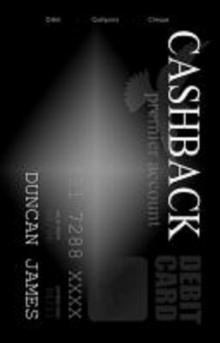 Cashback
Cashback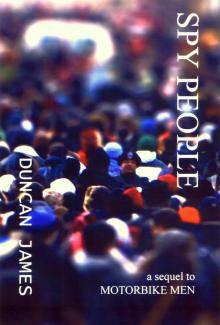 Spy People
Spy People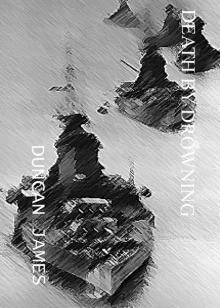 Death By Drowning
Death By Drowning Take Me Home
Take Me Home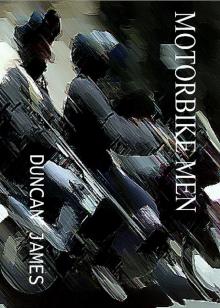 Motorbike Men
Motorbike Men